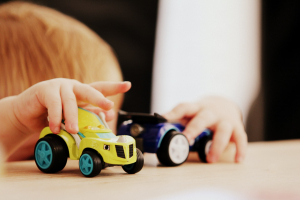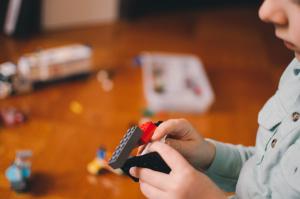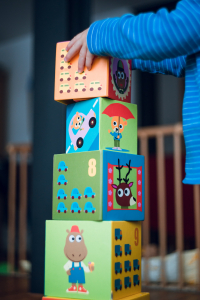For some children, it can be very distressing to be separated for any length of time from their parents or caregivers. While the separation can induce separation anxiety in children, at the same time parents can have mixed emotions.
 They can experience anger about the behavior, the desire to “have a break,” and even worry about their child with a longing to help the child feel safe. Severe separation anxiety can be debilitating for the whole family. Some clingy behavior is normal in children, but separation anxiety is another matter.
They can experience anger about the behavior, the desire to “have a break,” and even worry about their child with a longing to help the child feel safe. Severe separation anxiety can be debilitating for the whole family. Some clingy behavior is normal in children, but separation anxiety is another matter.
Separation anxiety occurs when a child reacts in anger, aggression, crying, and other distressing behaviors when separated for a length of time from their caregiver. Their minds are nearly consumed with thoughts of their parents, and they are difficult to console
Babies around 8-15 months old are beginning to develop more independence as they transition to toddlerhood, and this is usually the time when separation anxiety surfaces. They may become agitated and clingy when their parents leave them with their caretakers or simply leave for a short time.
Some children may experience it a bit later, such as when they are old enough to go to school if they have been home with a parent for the first few years of life. It usually goes away on its own in time with the assurance from their parents they need, but older children can experience it, too.
This can manifest at bedtime if a child does not want to be far from their parents or does not want to sleep over at another’s house (even with family) because his or her parents would be too far away. If separation anxiety lasts farther into childhood and the teenage years, it could indicate that more anxiety disorders could be at play.
Though the cause is not the same for every child, these could be some things that could lead to separation anxiety in children.
Causes of Separation Anxiety
Transitions (new school, a move, a move to a new city further away, new church, new baby in the home, in between divorced homes, etc.)
 Transitions can be disconcerting for adults, and parents often forget that these changes could be worse for children. Because children do not have the emotional intelligence that adults do, they are not always able to verbalize how they feel about changes. Their feelings result in their behavior as they exhibit separation anxiety symptoms.
Transitions can be disconcerting for adults, and parents often forget that these changes could be worse for children. Because children do not have the emotional intelligence that adults do, they are not always able to verbalize how they feel about changes. Their feelings result in their behavior as they exhibit separation anxiety symptoms.
Trauma
This could be experiencing a natural disaster, a serious accident, being the victim of any kind of abuse or neglect, witnessing domestic violence, or living through a severe illness, among other things. Trauma can not only affect one’s mental health, but it can also greatly affect the chemistry of the brain and body. Because parents are often considered the child’s “safest people” (whether perceived or accurate), they begin to cling to them more often after living through something traumatic or observing something traumatic.
Loss
When a close friend or family member passes away, a family becomes bankrupt, parents go through a divorce, or a child loses a pet, it is normal for a child to become clingier to parents. Other forms of loss may include when a child is separated from their parents for extended periods due to incarceration or job assignments. It can become unhealthy in the form of separation anxiety mentioned previously.
Maltreatment away from home
If something happens to a child away from home that is harmful in some way, they can become highly anxious to leave the safety of their home. Examples of this could be mistreatment from a teacher, being bullied, abuse out of the home, and/or not being included with friends at school or church.
Breach of safety
Any other type of experience that leads a child to feel unsafe in any way could also lead to separation anxiety. They begin to fear leaving the safety and comfort of their family environment, so they become upset if they ever have to leave.
How to help your kids
Give messages of reassurance
This is one of the best gifts one can give their children: reassurance. Remind them that they are safe and that if something happened in the past, it is not happening now. Help them know that you are there for them, no matter what. These statements can go far for a child. Be careful not to give false reassurance.
This will differ based on each situation but be cautious in making promises over which you may have little control. Just give reassurance that they will be OK apart from you. This is also a great time to share scripture about God that can help them know that they will be OK.
“Soften the blow” of goodbyes

It is not helpful to try to “sneak away” from children so that they do not see you leave. Parents often do this to avoid any of those separation anxiety behaviors, but in reality, it just leads to greater anxiety. Make it a point to tell your children where you are going and say goodbye with a hug.
To soften the blow of the goodbye, you could redirect their attention to something fun they are about to do in your absence. You could also make a fun joke or act silly to help them laugh and feel good about their next task.
Attend to their needs
Be attentive to the needs of your children. As they get older, they should be able to increasingly attend to their own needs, but for the most part, this is the role of the parent. If they know that you are here for them and will continue to take care of them as long as you are able, this knowledge can help decrease separation anxiety.
Teach them basic grounding skills
 Grounding skills are meant to bring a person to the present moment. Often separation anxiety will increase when a child is upset about something that has happened in the past or afraid of something that could happen in the future. Grounding skills can help them live in each moment.
Grounding skills are meant to bring a person to the present moment. Often separation anxiety will increase when a child is upset about something that has happened in the past or afraid of something that could happen in the future. Grounding skills can help them live in each moment.
Use their senses to teach them these skills. Do something to stimulate one or all of the five senses. For example, give them a comfort object to hold or sing of their favorite songs or have them color a picture.
Another way to engage the senses is the 5,4,3,2,1 exercise. Ask the child to tell you five things they can see, four things they can hear, three things they can feel, two things they can smell, and one thing they can taste.
Help them overcome any cognitive distortions
Cognitive distortions are thought patterns that lead someone to believe something that is not true or helpful. Take time with your child when they exhibit separation anxiety symptoms. Ask them what is wrong, what they are afraid of. Listen for any thoughts that seem irrational, unhelpful, unkind, unnecessary.
In this process, never dismiss their feelings. Validate their feelings, but gently provide another alternative thought process. For example, if they are scared that they won’t ever see you again when you drop them off at school, honor those feelings.
Then simply say something like, “No one knows what will happen every day, but every day before this one you see mom after school. You will have a lot of fun today. I can’t wait to hear about your day this afternoon. I love you!”
Another example, if they are scared of being around new people, you could say something like, “It’s OK to feel scared about meeting new people, but you are so friendly, and if you just be yourself, you will make friends in no time.” The goal here is to help them think differently about the situation so that their anxiety diffuses.
Though many children experience separation anxiety, it can get better over time. If your child is not getting better, it may be time to bring in a professional to work with your child.
“Playing With Cars”, Courtesy of Sandy Millar, Unsplash.com, CC0 License; “Building a Rocket”, Courtesy of Kelly Sikkema, Unsplash.com, CC0 License; “Building a Tower”, Courtesy of Markus Spiske, Unsplash.com, CC0 License; “You Can’t See Me!”, Courtesy of Zachary Kadolph, Unsplash.com, CC0 License








